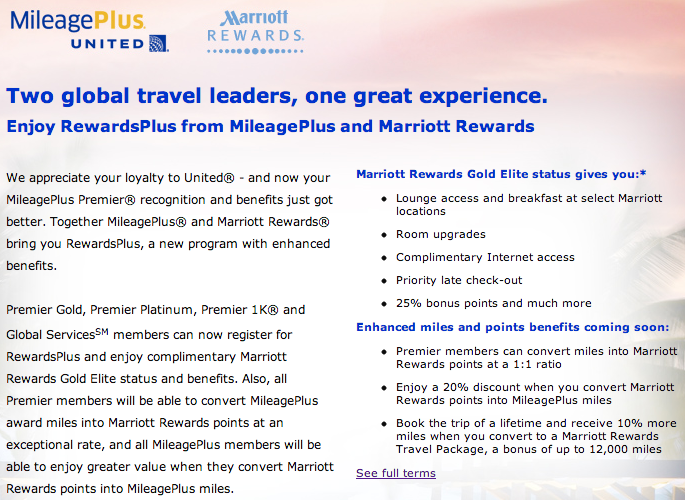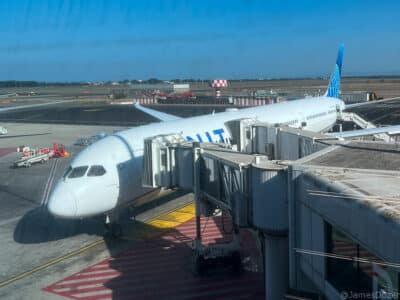@United sent out an ominous Twitter message last week telling MileagePlus members to “stay tuned” for coming changes to their rewards program. If there’s one thing people have learned about loyalty programs, it’s that change is almost never good. Especially when that news is likely to be released on a Friday. Fortunately it was just a really clumsy attempt to spur discussion, and the announcement made on Monday (much more promising) was a new partnership between United Airlines MileagePlus and Marriott Rewards.
Hence the awkward awkward combination of their names to create “RewardsPlus.” Can we call that a portmanteau? Sure, because the defined benefits of this new program are also an awkward combination of what you would expect from their their parents’ reputations. I generally think of United as having reasonably valuable and clearly defined benefits plus especially valuable frequent flyer miles. Marriott, however, makes it very difficult to obtain their top elite tier and leaves most benefits to the hotel’s discretion (even if they are often fulfilled to guests’ satisfaction).
Reciprocal Status Matches
Starting today, MileagePlus Premier Gold, Platinum, and 1K members will receive a match to Gold status with Marriott Rewards — a middle tier that normally requires 50 qualifying nights, or the same as Hyatt and Starwood’s top tiers. I would expect to see reasonably good benefits as a new Gold member but obviously lots of competition from all the people who have now gotten it for free. Gold status provides free Internet access and lounge access or breakfast. In theory it also provides late check-out privileges and room upgrades, but no specific room category or check-out time is guaranteed. (United elites: sign up for a match to Marriott Rewards Gold status.)
Marriott’s own members get little in return. Only it’s top-tier Platinum members will receive a match to United’s Premier Silver status. I guess it’s okay if you didn’t have anything before, but it offers minor benefits not much better than those provided to those with United’s co-branded credit cards. EconomyPlus seating at check-in may be okay, but I don’t see it as especially valuable. Premier Silver members who used to have E+ at booking will probably agree. It’s only valuable if you started with nothing, and I guess that’s where differences of opinion arise. (Marriott elites: sign up for a match to United MileagePlus Silver status.)
Pizza in Motion actually takes the exact opposite position from me, arguing that Marriott’s top elites are getting more from United than United elites are getting from Marriott. His argument makes sense, but if I was staying 75 nights a year at one hotel I probably already have better than Silver status with at least one airline. However, a frequent flyer may often visit cities that don’t have his or her preferred chain — something that I run into with Hyatt and Starwood — and would be glad for the benefits of Gold status on occasional stays with Marriott. I think this is Marriott’s true intention, as I describe below.
Improved Miles and Points Earn Rates
In the future, United and Marriott are working to improve the rates they offer when you transfer miles and points between the two programs, but if you’re already collecting most of your United miles in the form of Ultimate Rewards points, you already have the option to transfer to either program at a 1-to-1 ratio.
Marriott will allow members to transfer points at a 1-to-1 ratio from United, up to 50,000 miles per year. This is not a good deal. 50,000 miles will get me two domestic round-trip awards worth at least $1,000. A few more (55,000) will get me a one-way business class award to Europe. But Marriott charges 75,000 points for each night at their high-end Ritz-Carlton properties — and no room is worth $1,500 a night. The miles are more valuable.
In return, those who transfer points out of Marriott Rewards to United’s MileagePlus will get a 20% bonus. But a bonus on top of an already bad transfer rate is like putting lipstick on a pig since currently 50,000 miles requires 140,000 points. Most people should not transfer hotel points to airline miles. I’ve been guilty of this before, but only when I obtained those points at a ridiculously low price for the express purpose of transferring to miles.
Finally, Marriott is offering a 10% bonus on miles when you redeem points for one of its travel packages. Like Starwood’s Nights & Flights, these are a chance to get some free hotel nights in addition to frequent flyer miles in your favorite program (which you can then use to book the award tickets to your destination). The 10% bonus is capped at 12,000 miles, which isn’t really going to get you anywhere by itself, but free miles are free miles. To put this in perspective, seven nights at a Category 6 hotel plus 120,000 miles (132,000 with bonus) will cost 300,000 Marriott Rewards points. To upgrade to a Category 9 hotel, you’ll need 390,000 points.
What Could Make This Partnership Better?
This relationship seems to benefit United’s customers much more than it does Marriott’s, and perhaps that’s the point. I think (and I’m just guessing) that more people select a flight based on what’s cheapest and view the airlines as greedy companies that shake them up for add-on fees. But you spend several days at your destination, and a frequent flyer won’t always end up in a city with his or her preferred hotel chain. Maybe Marriott is using this as a way to encourage United’s high-value customers to spend more time at its properties over its competitors’, essentially a form of advertising rather than a true partnership. I just don’t see the same likelihood that United will be picking up a few extra passengers.
Pizza in Motion actually takes the exact opposite position from me, arguing that Marriott’s top elites are getting more from United than United elites are getting from Marriott, so his post might be worth a read.
To really make this new partnership seem worthwhile, I’d like to see the opportunity to transfer points to miles at a 1-to-1 ratio. But that will never happen because, as I said, Marriott’s points are worth so much less than United’s miles. I’d also like to see the chance to earn with both programs for activity with just one partner. For example, Starwood and Delta’s Crossover Rewards offers the chance to earn both Starpoints and SkyMiles when you are a customer of either company. United and Marriott haven’t really done much except match each others’ status and offer better transfer ratios.
Who’s Next, Hilton or Hyatt?
After Delta teamed up with Starwood and United teamed up with Marriott, many people are wondering where the next partnership will come from. American Airlines is the most likely candidate, but which hotel will it be?
I would place very good odds on Hilton for two reasons. The first is that Citi issues both companies’ credit cards. Note that both Delta and Starwood have cards issued by American Express, and both United and Marriott have cards issued by Chase. Even if there aren’t any contractual obligations involved with the card issuer, there is the potential ease of adding new offers in the future when both programs partner with the same bank.
Second, some people suggest that Hyatt may feel blindsided by this new development, but I disagree. Hyatt has always given me the impression that they are content to do their own thing. I’ve heard comments from a variety of Hyatt employees in the past year that suggest they are not looking to create a huge number of partnerships with other brands. They want to focus on developing and promoting their own brand. The recent partnership with MGM Resorts is an exception that fills a very real need to establish a competitive presence in Las Vegas, but that same logic doesn’t apply to a partnership with an airline.
If Hyatt does enter a partnership eventually, I expect it to also be with United Airlines. We’ve got the argument that they share a common card issuer, and Hyatt has previously worked with United on a few promotions (such as giving certain members 50,000 United miles as part of its “surprise and delight” program). Will this cause some grief with the folks at Marriott? Maybe, but they can easily be pushed aside. The current deal is relatively minor that I don’t think it represents a significant investment from either party. Instead it’s a game of “wait and see.” United probably just doesn’t want to be late to the game. It now has Marriott in its pocket while it tries to bargain for something better — perhaps a broader agreement or one with another hotel.





